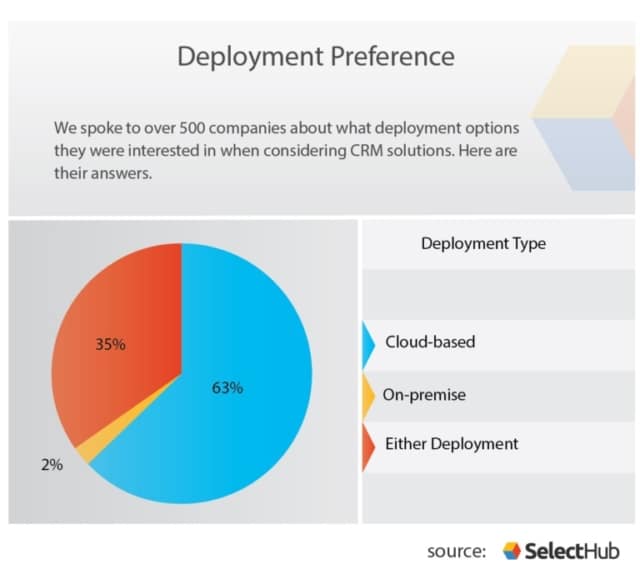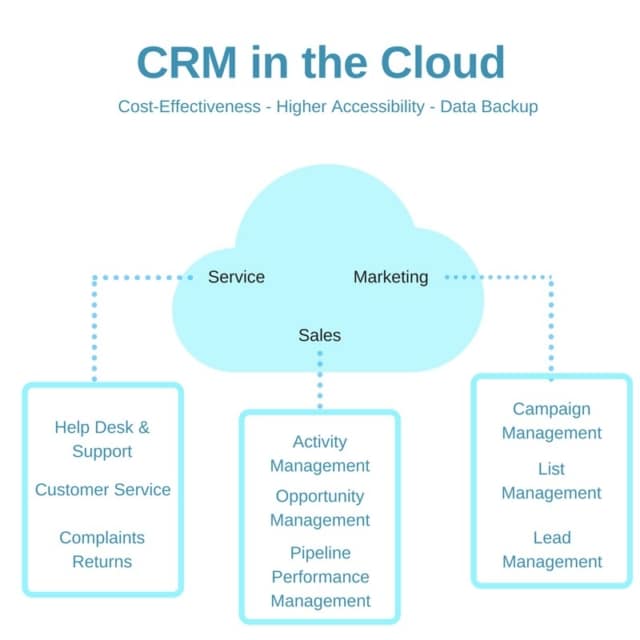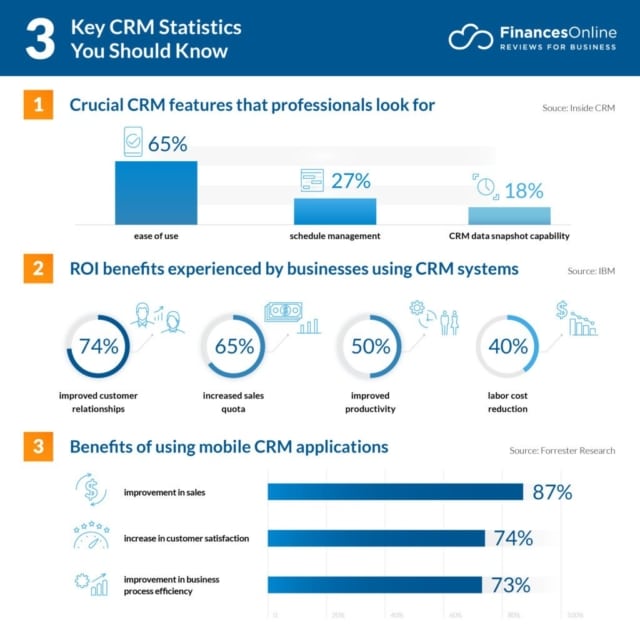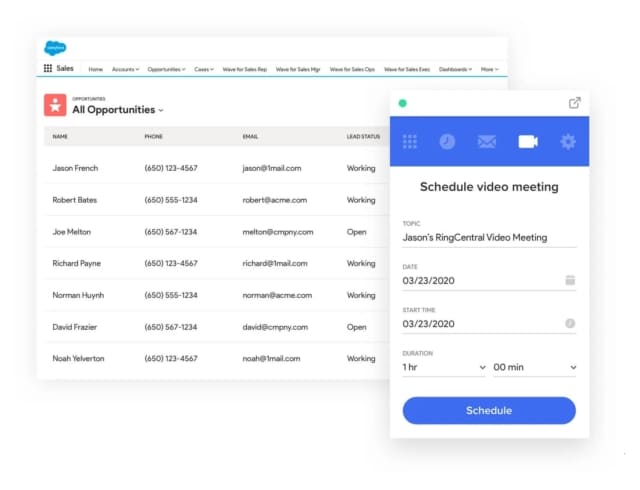Customer relationship management (CRM) is key to keeping your customers happy. It’s not enough to have one-off interactions – it’s all about maintaining a connection.
CRM encompasses the various strategies and practices involved in managing and analysing customer interactions. It provides businesses with data-driven insights which they can use to build better customer relationships and deliver a better overall customer experience.
Customer relationship management software pulls customer data together from across various channels to provide a better understanding of how customers interact with businesses. It also provides relevant customer information to staff, including their previous purchasing history, so that those staff can deliver a better service.
However, it’s worth remembering that there are different types of CRM software; it’s important to understand which is best suited to the needs of your specific business. In this guide, we’ll introduce you to hosted CRM and explain more about it.

What is hosted customer relationship management (Hosted CRM)?
Hosted CRM is accessed through the internet and is provided by an ASP (application provider). This is in contrast to in-house CRM (sometimes known as on-premises CRM), which is run through the company’s own servers and machines.
Most hosted CRM software comes in the form of software as a service (SaaS), a delivery model where software is licensed to clients on a subscription basis and accessed via the cloud.
You might be wondering whether hosted CRM could offer you the same kind of functionality that in-house CRM solutions provide. While it may be less customisable, it is designed to provide an identical standard and variety of tools and functions.
With hosted CRM, there’s typically no need to install software onto hard drives or to provide on-site server infrastructure, as the third-party hosting providers handle this themselves. Likewise, updates are handled entirely at the provider’s end, so any changes to the software should be rolled out to all users at the same time.

Which businesses can use hosted CRM?
There are lots of businesses which could benefit from embracing hosted CRM, but it’s particularly beneficial to small businesses and startups.
We’ll get into the benefits of hosted CRM in more detail in subsequent sections of this guide, but for now, the key point is that the cost savings of hosted CRM can be substantial. For smaller businesses, this can make a huge difference, freeing up financial and human resources that can be deployed elsewhere—namely, expanding your businesses and delivering even better customer support.
It’s good for remote teams too, as it helps to ensure business continuity wherever people are working. With hosted CRM, it’s easier to collaborate remotely and share workflows, as employees who are working outside of the office have easy access to the files they need.
Cloud-based CRM software helps smaller firms keep costs down, as well as offering flexibility and scalability for when your business expands. You can choose which features your business needs, and you don’t need to fork out for your own in-house IT team or additional hardware.

Who are hosted CRM providers?
There’s a diverse range of hosted CRM solutions to choose from. These include open source CRM tools like the following:
- SuiteCRM
- Vtiger
- SugarCRM
- EspoCRM .
Other hosted CRM providers include:
- Microsoft Dynamics
- Salesforce
- WordPress’ CRM plugin (a free CRM which integrates into the WordPress user dashboard).
Each of these CRM tools has its respective features and advantages, and there’s not enough space for us to get into those here. When choosing a hosted CRM provider, it’s important to do your research and make sure it has all the features you need.
It’s especially worth looking at the potential for integration with other software. RingCentral, for example, can be integrated with the Salesforce CRM, allowing you to make and receive calls directly from your Salesforce account.
The benefits of hosted CRM
More and more businesses are embracing hosted CRM, saving themselves the expense and hassle of on-premises CRM solutions. As well as cost savings, there are many benefits to hosted CRM. Here are our top few:
Ease of implementation
Unlike in-house solutions, you don’t need to build the tools from scratch or provide servers to host them. Instead, you can let a third-party provider handle all this, saving you a great deal of time and effort.
The user experience, of course, is also very important. Your business needs a CRM solution that’s intuitive and simple to use. There are cloud-based CRM tools which offer a clear user interface that’s easy to navigate, as well as easy-to-use features.

Lower costs
As we’ve discussed, hosted CRM reduces the need to have in-house IT professionals creating, maintaining and managing your CRM. Nor will you need to pay up for all the associated hardware, including servers.
Beyond this, CRM providers generally offer considerable flexibility. This means businesses can customise their plans so that they only include the features they want, as well as scale as needed. This allows them to make further cost savings.
Reliability and security
Two of the most important considerations for any business are reliability (i.e. maximum uptime, minimum downtime) and security, ensuring that valuable customer data stays out of the wrong hands and away from prying eyes.
Hosted CRM provides both. As far as reliability is concerned, CRM providers take responsibility for ensuring that systems are kept up and running. This allows clients to concentrate on doing what they do best while allowing their chosen CRM provider to take charge of data hosting.
When it comes to data security, hosted CRM again offers robust protection. You might wonder if data stored in the cloud may be more vulnerable to security breaches. However, providers are subject to stringent regulatory requirements in order to minimise any risk involved, and they often use SSL encryptions to bolster protection. Data stored in the cloud can also be backed up and restored easily if anything is lost.
Scalability and customisation
We mentioned earlier that cloud-based CRM offers a degree of flexibility that on-premises CRM simply can’t match. Third-party CRM providers understand that their clients’ circumstances are changing all the time, and that they therefore have to build scalability into their offering if they’re to meet the needs of those clients.
Hosted CRM often allows you to add new features to your cloud-based CRM plan when you need to. This means you can create a bespoke solution that’s tailored to your specific circumstances—and the needs of your customers. In turn, this helps to create better customer experiences and build long-term loyalties.
Facilitating remote working
The rise of remote working is perhaps the defining trend of our times. More and more businesses are embracing the opportunities associated with working from anywhere.
As a cloud-based solution, hosted CRM helps make businesses more mobile. It’s possible to access CRM software from wherever you happen to be, so long as you have the requisite user credentials. On-premises CRM solutions, by contrast, are inaccessible outside of the office.
This means that hosted CRM can allow employees to access important customer and client data while they’re out and about—particularly helpful, for example, when a client asks to see sales or growth data when you’re in an all-important meeting.

Best features of hosted CRM
The exact features offered by hosted CRM solutions will vary between different types of software, but there are certain key features which they all tend to have. These include the following:
Contact and lead management
With hosted CRM, it’s easy for agents to access data on existing customers and potential customers. Employees can pull up contact information, purchasing history and previous interactions. They can also track prospective leads, accessing information on targets—including tasks and targets—at each stage of the sales funnel.
Email tracking
Email clients such as Gmail can be synced with CRM systems, which saves agents and managers the trouble of having to log in and out of different services. They can check their contacts and calendars, as well as managing and creating emails (including email marketing and follow-up emails) within single workflows.

Analytics
With hosted CRM analytics, businesses can gain new insights into customer interactions, developing a better understanding by drawing on rock-solid data. Better still, interpreting that data is easy, as it’s presented in simple, customisable dashboard displays.
Workflow automation
As you’ll know already, there are lots of menial tasks which can take up an inordinate amount of your time. Hosted CRM software enables you to spare yourself and your team the hassle through workflow automation. Your chosen CRM tool will take care of many of these tasks, allowing your team members to get on with other things.
With CRM software, you can create workflows that either automate certain actions (like review requests a set amount of time after purchases) or present employees with follow-up reminders, gently nudging them to complete certain actions. In addition, workflow automation helps to reduce human errors as well as boosting productivity.
Sales forecasting and pipeline management
With detailed forecasting reports, hosted CRM allows agents to get a clearer overview of what’s going on in their sales pipelines (and check their targets while they’re at it). It also allows for more accurate lead qualifying, so that they have a better idea of which leads are most likely to translate into actual customers.
Your CRM tool will provide you with a full overview of your whole sales pipeline, as well as the status of each stage along the sales funnel. This will help you analyze how your sales are progressing, and enable you to accurately predict your future revenues.
Integrations
One of the most important factors to consider when choosing a cloud-based CRM tool is the number of integrations it offers. Integrations can enhance your team’s productivity; while there’s plenty your CRM software should be able to do on its own, it can help you get even more done by integrating with third-party tools.
Integrations can greatly extend your CRM software’s functionality, thus saving yourself and your colleagues the trouble of flicking back and forth between individual apps. This can help you streamline internal communication as well as in keeping in touch with customers.
RingCentral can be integrated with CRM apps including Zoho CRM, Agile CRM and HubSpot, as well as Salesforce, as we mentioned earlier.

How to start with hosted CRM
We’ve already touched on some of the basic questions you should ask yourself when deciding whether or not a hosted CRM solution is right for your business, and what you should consider when you come to choose one. Let’s look in more detail at some of the most important things you’ll need to think about:
- Can hosted CRM help you cut costs? If you’re running a small business, then your budget is always likely to be under some strain. If hosted CRM can help you reduce existing costs, it could provide you with valuable financial headroom.
- Are you planning to expand your business? We’ve mentioned that hosted CRM providers usually offer a substantial degree of flexibility and varied pricing plans, allowing you to scale up (or down) the features you pay for depending on the needs of your company.
- Which features are most important to you? Before committing to a particular type of CRM software, you need to think about whether it offers you the right features. Consider which specific features you need, and which ones you can do without.
- What about remote working? If your business is planning to expand remote working arrangements, or if it has already, then hosted CRM may be of use to your employees by enabling them to access the data they need, wherever they are.
- Does remote CRM offer reliability and security? As we’ve discussed, some businesses are still wary of cloud-based SaaS tools due to fears about data security, but remote CRM providers are held to stringent security standards. They can also offer greater reliability than on-site CRM functions.
- Can you really afford in-house IT professionals? With on-premises CRM comes in-house IT staff, in case anything goes wrong. By outsourcing your CRM functions to a third-party provider you can cut these costs.
Once you’ve answered these questions, you’ll need to take a detailed look at what’s out there on the market. Look at reviews of individual CRM tools and compare the features they offer. This will help you get a better idea of the kind of solution you really need.
How CRMs integrate with the RingCentral phone system
RingCentral’s cloud-based phone system effectively puts an end to switching between apps. This is because it can be integrated with apps – including customer support and CRM tools – from more than 200 other companies, including Google, Microsoft and Salesforce.
Businesses are benefiting substantially as a result. For example, Goosehead Insurance saw a 100% increase in its number of calls viewed and analysed with RingCentral, while Ross Education was able to integrate its phone and customer relationship management systems, allowing its staff members to be more productive.
With RingCentral, your agents can make calls, send messages, join video meetings and manage customer relationships, all in the same place. This means that your team can spend less time hopping from app to app, and more time doing what they do best: keeping customers happy.
Originally published Jun 02, 2021

